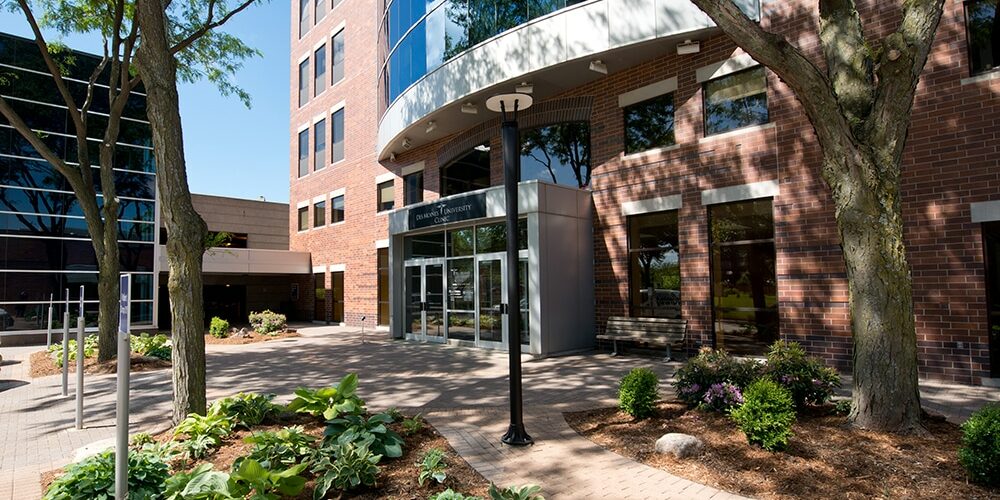

The DMU Behavioral Health Clinic Offers Comprehensive Psychiatric Services
The Des Moines University Behavioral Health Clinic offers medication management services. Our providers can assist with the diagnosis and treatment of depression, anxiety, mood disorders, panic attacks, obsessive-compulsive disorder, post-traumatic stress disorder and other behavioral or mental health conditions.
The Behavioral Health Clinic is located on the seventh floor of the DMU Clinic. We are currently accepting patients age 18 or older. Please plan for 60-90 minutes for the initial appointment, with approximately 30 minute follow-up appointments for medication management services.
Conditions We Treat
-
Medication Management
Psychiatric disorders are treated in a variety of ways depending on the individual and diagnosis. There are times when mental illness can be treated with therapy alone, but often, certain illnesses require medications as part of treatment as well.
Our providers at DMU Behavioral Health Clinic offer medication management services for a wide variety of mental health illnesses. These include mood disorders, anxiety disorders, panic attacks, OCD, PTSD and many others.
-
Depression
Depressive disorders are characterized by persistent feelings of sadness, hopelessness, and a loss of interest in life activities. It is common for individuals to feel sad or down for brief, transient periods of time, but can be extremely problematic if it persists for extended periods of time. Depression can affect sleep, concentration, motivation, relationships, and ability to function at work, school, or in daily life.
There are multiple ways to treat depression including medications, therapy, and even more novel treatments are available. Schedule an appointment at the DMU Behavioral Health Clinic to see what treatment would be most appropriate for you.
-
Perinatal Mood and Anxiety Disorders
Mood and anxiety symptoms are among the most common complications that occur in pregnancy. These can be debilitating. Having an expert resource provide care and evidence-based recommendations to a mother during one of the most emotional times is important for the health of the mother and baby. DMU Behavioral Health Clinic can assist women who are struggling with mood symptoms either during hormonal shifts with a monthly cycle or while trying to conceive, during pregnancy, breastfeeding and through menopause.
-
Anxiety and Panic Attacks
Stress and worries can be appropriate at times. It can motivate people to meet deadlines at work, study for an important test, and respond correctly to a dangerous situation. However, anxiety can become exaggerated and interfere with daily life. Symptoms of anxiety disorders include panic attacks, irritability, restlessness, reduced concentration, and sleep disturbances. There are a variety of anxiety disorders, and what provokes anxiety and how someone responds can vary between these disorders. In addition to therapy, medications can be extremely beneficial in treating anxiety disorders in both the short-term as well as in the long-term.
-
Obsessive-Compulsive Disorder
OCD is a condition that can be characterized by intrusive thoughts or images, and/or compulsive behavior that is disruptive to an individual’s day. These thoughts and compulsions can consume hours in someone’s day and be incredibly debilitating. People with OCD being treated with medications, therapy, or a combination of the two can have a tremendous response and get back to living a fully functional life.
-
Post-Traumatic Stress Disorder
PTSD is a disorder that develops after witnessing or experiencing a traumatic event. Individuals with this disorder can have intrusive thoughts of the experience or even relive it. PTSD can cause a wide range of symptoms including having negative views of themselves or the world, increasing anxiety, disrupting sleep, and worsening concentration amongst others. Various classes of medications and types of therapies can be significantly beneficial for this condition.
Meet Our Providers
What is the difference between a psychiatrist and a psychologist?
Psychiatrists are medical professionals involved in both the diagnosis and treatment of mental health and behavioral issues. Psychiatrists differ from psychologists or counselors in that they undergo training in medical school, and complete a residency in psychiatry which allows them to prescribe medications for psychiatric illness.
Emergencies
If you are experiencing a medical or mental health emergency, please call 911 or go to the nearest emergency room. We do not offer after-hours, or weekend and holiday on-call services. If you have other questions that can wait until the next business day, please leave a voicemail at the clinic and we will get back to you the next business day. If it is more urgent and cannot wait until the next business day, please go to the nearest emergency department, or call 911.
Other Resources
988 Suicide and Crisis Lifeline
If you or someone you know is experiencing suicidal thoughts or an emotional crisis, the Suicide and Crisis Lifeline may be reached by:
- Calling 988
- Sending a text to 988
- Sending a chat at 988lifeline.org/
Mental Health Crisis Services – Broadlawns
Call the Your Life Iowa Hotline at 855-581-8111 and let them know you would like to have the mobile crisis team respond in person.



